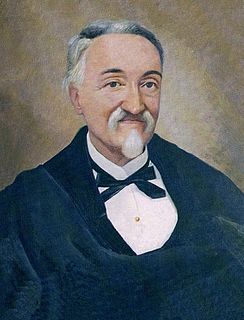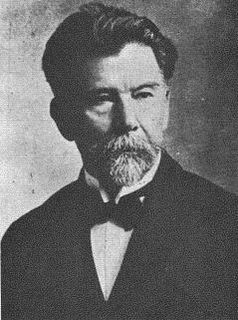
Edward Stanhope PC(24 September 1840 – 21 December 1893) was a British Conservative Party politician who was Secretary of State for War from 1887 to 1892.
John Thomas Ball QC was an Irish barrister, judge and politician in the Parliament of the United Kingdom of Great Britain and Ireland, and Lord Chancellor of Ireland.

Manuel de Ascázubi y Matheu served as Vice President of Ecuador from 1847 to 1849 and in that capacity he was also interim President from 16 October 1849 to 10 June 1850.
The Leominster by-election was a by-election held on 15-16 February 1876 for the British House of Commons constituency of Leominster in Herefordshire.

Benjamín Herrera was a Colombian politician and general. Born in Cali, Colombia in 1853. In 1875, while he was a student at the University of Cauca, Herrera joined the liberal army under César Conto to topple the conservative governor of Antioquia. He fought in the civil war for a decade until 1885, when the liberal forces were defeated and he decided to settle down in Pamplona, Colombia. In 1895 he returned to the political scene, gaining resources for a new liberal army against a new conservative governor. In the Thousand Days' War he became the main military strategist on the liberal side of the war, and, second to Rafael Uribe Uribe he became the main figure of Colombian liberalism. After the war, in 1905, he was elected to the Chamber of Representatives of Colombia. In 1905 and early 1906, he commanded the Colombian army forces confronting Venezuela, In 1909 Herrera became a senator, and in 1914 he became Minister of Agriculture under the government of Jose Vicente Concha. In 1922 he was the presidential candidate for the Colombian Liberal Party. He founded the Universidad Libre in 1923. Herrera died in 1924.
The West Suffolk by-election of June 1875 was fought on 16 June 1875. The by-election was fought due to the death of the incumbent Conservative MP, Lord Augustus Hervey. It was won by the Conservative candidate Fuller Maitland Wilson.
The Horsham by-election of 1875 was fought on 17 December 1875. The byelection was fought due to the resignation of the incumbent Conservative MP, William Vesey-FitzGerald, who became Chief Charity Commissioner for England and Wales. It was won by the Liberal candidate Robert Henry Hurst (junior). who had previously been MP for the seat but was defeated at the previous General Election.
The Whitehaven by-election of 1875 was fought on 16 December 1875. The byelection was fought due to the incumbent Conservative MP, George Cavendish-Bentinck, becoming Judge Advocate General. It was retained by the incumbent.
The Mid Surrey by-election of 1875 was fought on 24 November 1875. The byelection was fought due to the resignation of the incumbent Conservative MP, Richard Baggallay. It was won by the Conservative candidate Sir Trevor Lawrence.
The South West Lancashire by-election of 1875 was fought on 6 November 1875. The by-election in the South West Lancashire was fought due to the incumbent Conservative MP, Charles Turner's death. The Conservative candidate John Ireland Blackburne won the election.
The Armagh City by-election of 1875 was held on 18 October 1875. The byelection was fought due to the death of the incumbent Conservative MP, John Vance. It was won by the Conservative candidate George Beresford.
The Blackburn by-election of 1875 was fought on 30 September 1875. The by-election was fought due to the death of the incumbent Conservative MP, Henry Master Feilden. It was won by the Conservative candidate Daniel Thwaites.
The Breconshire by-election of 1875 was fought on 20 May 1875. The byelection was fought due to the succession to a peerage of the incumbent Conservative MP, Godfrey Morgan. It was won by the Liberal candidate William Fuller-Maitland.
The St Ives by-election of 1875 was fought on 5 March 1875. The by-election was caused by the previous by-election being declared void on petition, on grounds of "general treating".. It was retained by Conservative MP, Charles Praed.
The Dublin University by-election of February 1875 was fought on 11 February 1875. The byelection was fought due to the incumbent Conservative MP, David Robert Plunket, becoming Solicitor General for Ireland. It was retained by the incumbent.
The East Kent by-election of 1875 was fought on 27 January 1875. The byelection was fought due to the succession to a peerage of the incumbent Conservative MP, George Milles. It was won by the Conservative candidate Wyndham Knatchbull.
The Dublin University by-election of January 1875 was fought on 18–22 January 1875. The byelection was fought due to the resignation of the incumbent Conservative MP, John Thomas Ball. It was won by the Conservative candidate Edward Gibson.
The St Ives by-election of 1874 was fought on 28 December 1874. The byelection was fought due to the death of the incumbent Conservative MP, Edward Davenport. It was won by the Conservative candidate Charles Praed who received 617 votes against Liberal candidate Sir Francis Lycett's 552 votes. During the election, the town held a holiday, with shops closed and ships not leaving harbour.
Elections to Liverpool Town Council were held on Monday 1 November 1875. One third of the council seats were up for election, the term of office of each councillor being three years. Eleven of the sixteen wards were uncontested.
All of the sixteen wards were uncontested.



